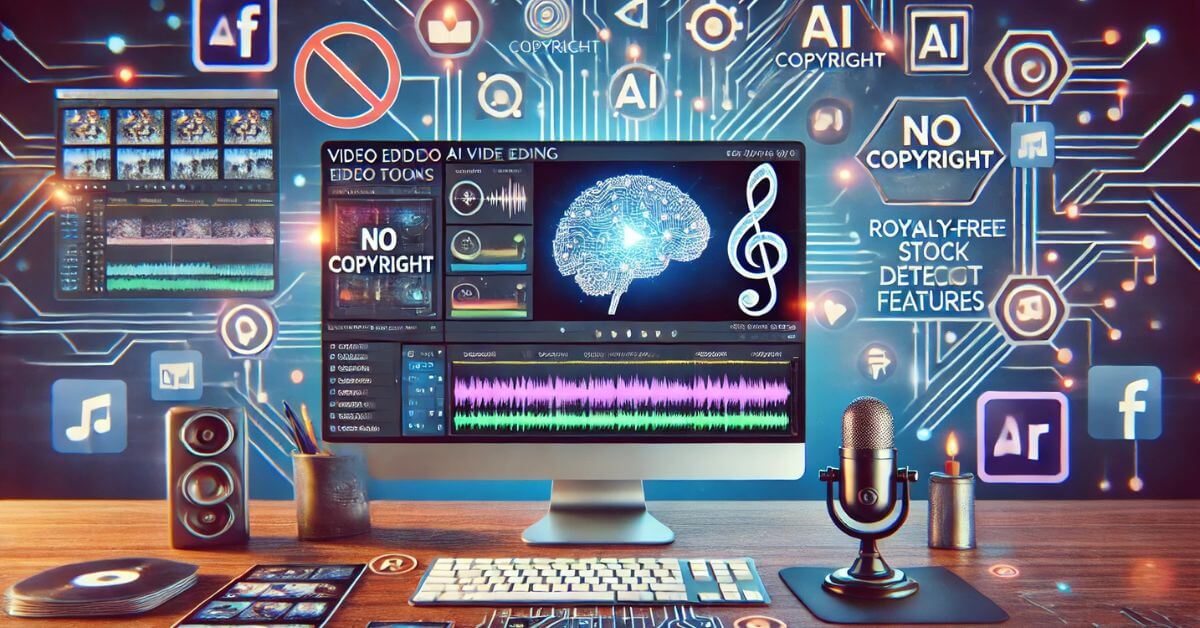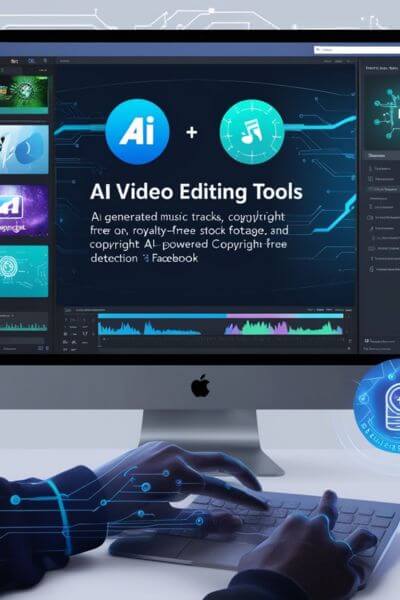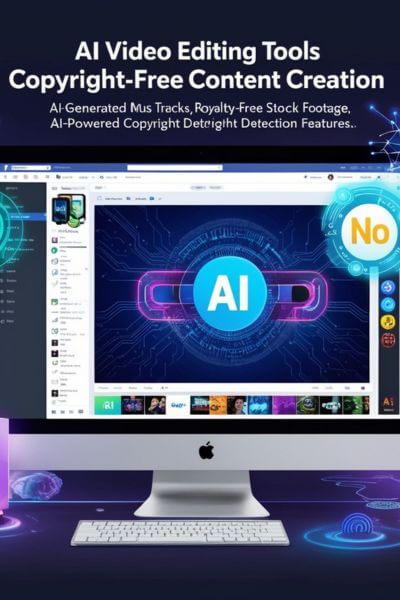AI Video Editing Without Copyright Issues
A Guide for Facebook Creators
Video content has become one of the most powerful tools for engagement in the digital age. Whether you’re a marketer, content creator, or brand, videos on platforms like Facebook have the potential to captivate audiences, drive traffic, and create meaningful connections. However, as video creation continues to soar in popularity, so do concerns about copyright violations, especially when using third-party music, images, and video clips. Copyright issues can result in content removal, penalties, or even legal disputes, making it crucial for creators to ensure their videos comply with copyright regulations.
Fortunately, Artificial Intelligence (AI) has emerged as a transformative tool in video editing, offering solutions to help creators avoid copyright pitfalls. In this guide, we’ll explore how AI can enable Facebook creators to produce content that is both high-quality and free from copyright issues. By understanding AI’s role in this process, creators can harness the full potential of their videos, all while avoiding the risks of copyright infringement.
The Growing Challenge of Copyright Issues for Facebook Creators
Facebook remains one of the most popular platforms for content creators, with over 2.9 billion monthly active users. Whether for personal, commercial, or promotional purposes, creators constantly upload video content to engage their audiences. However, Facebook’s stringent copyright rules are a challenge many creators face. Music, images, and video clips from unauthorized sources can easily lead to copyright strikes or even account suspensions.
Facebook has an advanced system called Rights Manager, which uses AI to automatically detect and flag copyrighted content. While this protects the rights of original creators, it can also create problems for users who mistakenly incorporate copyrighted material. With AI tools, creators can better navigate this complex landscape, ensuring their videos remain compliant without compromising creativity.
How AI Video Editing Tools Can Help Creators Stay Copyright-Free on Facebook
AI-powered video editing tools have become increasingly sophisticated, offering ways for Facebook creators to avoid copyright issues while creating engaging content. Let’s dive into some key ways these AI tools help ensure copyright compliance:
1. AI-Generated Music and Soundtracks
One of the most common sources of copyright infringement in videos is music. Many creators use popular songs without realizing that they’re not licensed for use on Facebook. AI-driven platforms like Amper Music, Aiva, and Jukedeck offer royalty-free, AI-generated music tailored to the specific mood or genre of your video. These platforms create unique tracks from scratch, giving creators music that fits their content while ensuring no copyright issues arise.
Real-Life Example: A Facebook video creator who regularly posts travel vlogs might use Amper Music to generate a lively, upbeat soundtrack for their video. By using AI-generated music, the creator avoids any potential copyright claims from third-party songs, all while maintaining an engaging atmosphere for viewers.
2. AI-Powered Copyright Detection Tools
AI is also transforming how creators can check their content for copyright compliance before posting. Tools like Adobe Premiere Pro and Magisto offer built-in features that scan uploaded media and identify potential copyright risks. Additionally, Facebook’s Rights Manager uses AI to automatically detect copyrighted music, videos, or images in your posts. Creators can use these tools to detect copyrighted elements within their videos, allowing them to replace or modify content before it’s uploaded.
Real-Life Example: A Facebook marketer creating an ad campaign uses Adobe Premiere Pro’s AI-powered plugin to scan the video before it’s uploaded. The AI identifies a music clip that is copyrighted and alerts the user, allowing them to replace the track with a royalty-free option, ensuring the ad remains compliant with Facebook’s policies.
3. Access to AI-Enhanced Stock Footage and Image Libraries
For many creators, stock footage and images are an essential part of video content. However, stock media can also present a copyright risk if it’s not properly licensed. AI-powered libraries, such as Storyblocks and Pexels, provide a vast collection of royalty-free images and videos that are pre-cleared for use in Facebook videos. These platforms use AI to ensure that all content available is free from copyright restrictions, making it easier for creators to find the perfect assets for their projects.
Real-Life Example: A small business owner creating a promotional video for their Facebook page can use AI-driven platforms like Storyblocks to access a library of high-quality, copyright-compliant stock footage. This allows them to enhance their video without the worry of licensing issues.
4. AI-Powered Video Editing for Seamless Content Creation
AI video editing tools streamline the video creation process by automatically suggesting edits, transitions, and visual effects. Tools like Magisto and Filmora use AI to analyze video footage and make editing decisions that enhance the video’s flow and engagement. Many of these platforms also offer royalty-free media, which helps creators stay within copyright laws while still producing engaging content.
AI tools can also help format videos for Facebook, ensuring that they meet the platform’s specifications, such as the ideal aspect ratio, video length, and resolution.
Real-Life Example: A content creator planning to post a cooking tutorial on Facebook uses Magisto to automatically edit their raw footage. The AI tool suggests the best transitions, adds text overlays, and adjusts the video format for Facebook’s mobile users. Since the software uses royalty-free music and stock footage, the final video is both engaging and copyright-compliant.
5. Creating Unique Content with AI-Generated Visuals
For more advanced creators, AI can be used to generate entirely unique content. Tools like Runway ML allow creators to generate deepfake videos, avatars, or entirely new visuals that are free from third-party copyright restrictions. This kind of AI-powered content creation provides an alternative to using existing footage or images, ensuring full creative control while eliminating copyright concerns.
Real-Life Example: An educational content creator uses Runway ML to generate a custom animated avatar that presents the lesson in a unique way. The avatar is entirely AI-generated, meaning there are no concerns about copyright issues from using real-life actors or third-party stock videos.
Best Practices for Avoiding Copyright Issues with AI Video Editing
While AI offers many advantages, creators must still take steps to ensure their content remains copyright-compliant. Here are a few best practices:
- Understand Licensing Terms: Even when using AI-generated music or visuals, it’s crucial to check the licensing terms of the content. Some AI platforms offer royalty-free content, while others may have restrictions depending on how you use the media (e.g., commercial use).
- Regularly Update with Platform Policies: Copyright laws and platform policies can change frequently. Keep an eye on Facebook’s rules regarding music, video clips, and other content to avoid accidental violations.
- Use Trusted AI Tools: Stick to reputable AI video editing platforms with a strong track record for copyright compliance, such as Adobe Premiere Pro, Magisto, and Storyblocks. These platforms typically vet their content and ensure it’s cleared for use.
- Generate Custom Content: The safest option is always to create original, AI-generated content. Whether it’s music, images, or video clips, custom content eliminates the risk of using copyrighted materials.
- Preview Content Before Uploading: Always preview your video before uploading it to Facebook, and use AI-powered copyright detection tools to double-check for potential infringements.
Conclusion: Embracing AI for Safe and Creative Facebook Video Production
AI video editing tools are transforming how creators produce content for Facebook, offering innovative solutions to ensure compliance with copyright regulations. By using AI to generate music, detect copyrighted material, and access royalty-free media, creators can focus on producing high-quality, engaging videos while avoiding legal pitfalls.
As AI continues to evolve, it will undoubtedly provide even more tools to simplify the video creation process and reduce copyright risks. However, it’s important for creators to stay informed about the licensing terms, platform policies, and best practices for using AI responsibly.
The question now is: How will AI further shape the future of content creation on Facebook? Will it open up more creative opportunities or bring about new challenges in terms of content ownership? One thing is clear—AI is an invaluable asset for Facebook creators looking to navigate the complex world of copyright, and its role will only grow in the coming years.
Here are the top 10 frequently asked questions (FAQs) based on the article
1. What is AI video editing?
AI video editing uses artificial intelligence tools to automate various aspects of video creation, including editing, music selection, visual enhancements, and copyright compliance. These technologies facilitate the rapid and effective production of high-quality videos by creators.
2. How does AI help avoid copyright issues in video editing?
AI video editing tools can detect copyrighted music, images, and video clips within a project. They also offer royalty-free alternatives and generate original content, ensuring that creators don’t inadvertently use copyrighted materials that could lead to issues on platforms like Facebook.
3. What are some AI tools that help with copyright-free music?
AI-powered music generation platforms like Amper Music, Aiva, and Jukedeck allow creators to generate royalty-free, custom music that fits the mood of their video. These tools ensure that the music used is original and free from copyright infringement.
4. Can AI tools automatically detect copyright violations in my video?
Yes, platforms like Adobe Premiere Pro and Facebook’s Rights Manager use AI to automatically scan uploaded videos and detect any copyrighted elements, such as music or stock footage, that may violate copyright laws.
5. Are there AI tools for finding copyright-free stock footage?
Yes, platforms like Storyblocks and Pexels use AI to curate and organize royalty-free stock footage, ensuring that creators can access safe-to-use content for their videos without worrying about licensing issues.
6. How can AI help with video editing for Facebook?
AI tools can help optimize video content for Facebook by adjusting the video’s aspect ratio, format, and length. Some tools, like Magisto, also suggest the best transitions, music, and edits tailored for Facebook’s audience.
7. What are the risks of using AI-generated content on Facebook?
While AI-generated content minimizes the risk of copyright violations, creators must still be aware of licensing terms and platform policies. AI-generated music and stock footage should be checked for commercial-use licenses, and Facebook’s policies should be monitored for any changes.
8. Can I use AI tools to create completely original videos?
Yes, AI tools can help you create entirely original videos. For instance, you can use AI to generate custom avatars, animated characters, or backgrounds, which ensures that you are not relying on third-party content, thereby avoiding copyright issues.
9. Do I need special knowledge or skills to use AI video editing tools?
No, most AI video editing tools are user-friendly and designed for creators with varying levels of experience. They often feature intuitive interfaces that guide users through the video creation process, making it easier for even beginners to produce professional-quality videos.
10. How can I ensure my Facebook videos are copyright-compliant?
To ensure your Facebook videos are copyright-compliant, use AI-powered editing tools to check for copyright issues before uploading, select royalty-free music and visuals, stay updated with Facebook’s copyright policies, and use trusted platforms that offer licensed media.




0 Comments